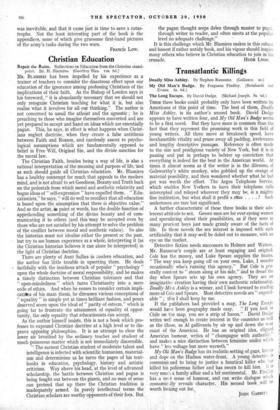Christian Education
Repair the Ruins. Reflections on Education from the Christian stand- point. By. H. Blamires. (Geoffrey Bles. 123. 6d.) MR. BLAMIRES has been impelled by his experience as a trainer of teachers to consider the disastrous effect upon our education of the ignorance among professing Christians of the implications of their faith. As the Bishop of London says in his foreword:/ it is abundantly necessary that we should not only recognise Christian teaching 'for what it is, but also realise what it involves for all our thinking." The author is not concerned to assail the atheist and the agnostic ; he is preaching to those who imagine themselves converted and are yet prepared to accept and hand on ideas which are essentially pagan. This, he says, in effect is what happens when Christ- ians neglect doctrine, , when they create a false antithesis between Faith and Reason, and carelessly assent to psycho- logical assumptions which are fundamentally opposed to belief in Free Will, Original Sin, and the divine sanction for the moral law.
The Christian Faith, besides being a way of life, is also a rational interpretation of the meaning and purpose of life,-and as such should guide all Christian education. Mr. Blamires has a healthy contempt for much that appeals to the modern mind, and is not afraid to set Goodness, Beauty and Truth back on the pedestals from which moral and aesthetic relativity and bogus ideas of " self-expression " have expelled them. " Edu- cationists," he says, " will dO well to recollect that all education is based upon the assumption that there is objective value." And so the artist, paint or words, has the double function of apprehending something of .the divine beauty and of com- municating it to others (and this nay be accepted even by those who are not satisfied by his attemptto solve the problem of the conflict between moral and aesthetic values). So also the historian must not idealise either the present or the past, but try to see human experience as a whole, interpreting it (as the Christian historian believes it can alone be interpreted) in the light of Christian doctrine.
There are plenty of Aunt Sallies in modern education, and the author has little trouble -in upsetting them. He deals • faithfully with the insidious attack of popular " psychology " upon the whole doctrine of moral responsibility, and he makes a timely distinction between Christian tolerance and that " open-mindedness " which turns Christianity into a mere code of ethics. And when he comes to consider certain impli- catiens of his main thesis, he ditcusses various conceptions of " equality " in simple yet at times brilliant fashion, and pours deserved scorn upon the ideal of " parity of esteem," which is going far to frustrate the attainment of equality of. oppor- tunity, the only equality that educationists can accept. As the author himself insists, this is not a book which pro- fesses to expound Christian doctrine at a high level or to dis- prove opposing philosophies. It is an attempt to clear the lower air breathed by the ordinary teacher and student of much poisonous matter which is not immediately discernible.
" The earnest Christian student of moderate talent and intelligence is infected with scientific humanism, material- ism and determinism as he turns the pages of his text- books in education, psychology, history and artistic criticism. Way above his head, at the level of advanced scholarship, the battle between' Christian and pagan is being fought out between the giants, and no man of sense can pretend that up there the Christian tradition is inadequately armed. In purely intellectual terms the Christian scholars are worthy opponents of their foes. But the pagan thought seeps claim through master to pupil, through writer to reader, and often meets at the popular level no adequate challenge."
It is this challenge which Mr. Blamires makes in this robust and honest if rather untidy book, and his vigour should inspire many others who believe in Christian education to join in his


















 Previous page
Previous page